Side Quests: Fictional Characters Behaving Badly
Analyzing when I love or loathe messy characters—plus 12 books with delightfully diabolical protagonists.
Welcome to Side Quests, a monthly newsletter series in which I go down reflective rabbit holes related to my recent reads or reading life more broadly. No spoilers unless explicitly noted.
There’s a certain type of character that has become quite prevalent in fiction the last several years now: the “hot mess express.” This type of character is usually (but not always) female; they’re often in their 20s, although this can fluctuate younger or older depending on their life circumstances; and they are depicted as consistently making bad decisions that further entrench them in the mess they’ve made of their life. Recent popular examples of this include My Year of Rest and Relaxation by Ottessa Moshfegh; Luster by Raven Leilani; and Normal People by Sally Rooney. This character has been popularized beyond the page too, one of the most beloved (and a personal favorite) being Phoebe Waller-Bridge’s Fleabag.
Clearly there is a huge appetite for “hot mess express” characters; I assume many readers find them relatable or like to vicariously satisfy their own desire for chaos through these stories. I, however, tend to avoid books featuring this flavor of messy main character; while I can sometimes enjoy them, it’s more of an exception than a rule. Generally I have little patience for their mess and their willful desire to remain in toxic cycles and situations.
There are, however, plenty of books I read—and most of the time, particularly love!—that feature characters making bad decisions or doing bad things; but these kinds of stories feel completely different from the “hot mess express” wheelhouse. I realized that it comes down to a few key differentiators, which I’ve attempted to unpack here.
Bad But Beneficial
The first is that I prefer when messy characters make bad decisions that ultimately benefit themselves versus making decisions that only result in self-harm. Sign me up for any story featuring a con artist, scammer, vengeful spouse, murderer—these kinds of questionable choices are usually rooted in furthering the character’s own gains, whether it’s in pursuit of wealth, safety, anonymity, access, or simply personal satisfaction (even when it’s unhinged). These are the characters that star prominently in the kinds of twisty, dark, and exciting stories I love—usually mysteries, thrillers, and horror, but also within plenty of literary fiction. Though I myself would never in a million years want to live the high-stress, morally grey (or often, morally abhorrent) lives these characters lead, I can at least see the general logic driving their actions. In these cases, the “bad” describes the moral nature of their decisions, but the decisions themselves can arguably be seen as “good” in that they may actually benefit the character.
This is more than I can say for “hot mess express” characters, who make choices such as staying in toxic relationships, messing around at work, becoming addicted to drugs, wasting their time or money where they shouldn’t—the list goes on. Are these scenarios much more relatable and realistic than those of my diabolically messy villains? Yes, but that only makes it harder for me to empathize with these characters for always making bad choices—in this case, “bad” because they actively harm the character. I know this is something we as human beings do in real life; but I’ve never been one to pursue mess and I have little patience watching others go down messy, harmful paths—even in fiction. The majority of the time I simply don’t find these kinds of stories enjoyable or relatable; they just cause me frustration and anxiety, or worse, make me roll my eyes and want to shake the characters until their teeth rattle.
Bad to the Bone
The second nuance goes hand-in-hand with this, which is: I prefer messy characters to be acknowledged as bad people versus portraying a good person who is making bad decisions. I relish a truly unlikeable character and can be more freely entertained by the chaos they invite into their lives when I know upfront that they’re a bad egg. It’s fun to witness someone villainous navigate a path that will ultimately lead to their own destruction (or, occasionally, their success, if they somehow manage to emerge unscathed by the end); but it’s stressful and downright sad seeing someone who deserves better constantly making harmful decisions that only end up hurting themselves and others.
Justifiable Villainy
A third scenario that I am seeing (and loving) more and more often in fiction lately, is the character who isn’t a bad person necessarily but has suffered in some way at the hand of either another person, or life circumstances, or societal structures, and they have now gone to the dark side, if you will. In this scenario, these characters are making bad decisions, but you’re mostly on their side because you understand what has driven them to this point; usually the book is using these characters to make a larger argument and demonstrate the effects of class inequalities, or racial prejudices, or gender imbalances. You find yourself rooting for these characters even as they commit questionable or heinous acts because their bad behavior helps balance the scales or get back at the problematic powers that be. I’m really loving that these kinds of stories are having a literary moment (and there are lots of these on my list for you below).
If your taste aligns with mine, here are some book recs featuring my preferred flavor of messy protagonists. I’m always looking for more books like these so please do leave any recs in the comments, so I can add them to my own TBR.
Choose your fighter:
Con artist playing wealthy socialite
Retreat by Krysten Ritter. Protagonist Liz has moved among high-society circles for years as a successful con artist. She gets the opportunity to install valuable art for wealthy woman Isabelle in her extravagant Mexican villa and while there, decides it won’t hurt to step into Isabelle’s life for a while. Until she realizes Isabelle’s life might be more complicated than it seems.
Mastermind manipulator and scammer
Don’t Let Him In by Lisa Jewell. Restauranteur Paddy Swann was the life of the party until the day a man pushed him in front of a train. Left behind are twenty-something daughter Ash and widow Nina; and not long after the funeral, they receive a surprise package from Paddy’s old friend Nick. Nick is a man of substance and good taste. He has a smile that could melt the coldest heart and a knack for putting others at ease. But to Ash, Nick seems too slick, too polished, too good to be true.
High-school kids turned blackmailers
Bad Kids by Zijin Chen. One beautiful morning, Zhang Dongsheng pushes his wealthy in-laws off a remote mountain. It's the perfect crime. Or so he thinks. For Zhang did not expect that three teenagers would catch him in the act while they're working on a photography project. When an opportunity for blackmail presents itself, the trio start down a dark path that will lead to the unravelling of all their lives.
Psycho nurse turned librarian
How Can I Help You by Laura Sims. No one knows Margo’s real name. Her colleagues and patrons at a small-town public library know only her middle-aged normalcy, congeniality, and charm. They have no reason to suspect that she is, in fact, a former nurse with a trail of premature deaths in her wake. She has turned a new page, so to speak, and the library is her sanctuary, a place to quell old urges. That is, until Patricia, a recent graduate and failed novelist, joins the library staff. Patricia quickly notices Margo’s subtly sinister edge, and watches her carefully.
Reclusive man hiding something from his meddlesome new neighbor
The Last House on Needless Street by Catriona Ward. In a boarded-up house on a dead-end street at the edge of the wild Washington woods lives a family of three. A teenage girl who isn’t allowed outside, not after last time. A man who drinks alone in front of his TV, trying to ignore the gaps in his memory. And a house cat who loves napping and reading the Bible. An unspeakable secret binds them together, but when a new neighbor moves in next door, what is buried out among the birch trees may come back to haunt them all.
Married couple who murder for fun
My Lovely Wife by Samantha Downing. Our protagonist is a happily married man—he loves his beautiful wife, their adorable kids, and their picture-perfect life in the suburbs. To keep their passion alive and stave off boredom, they just happen to have the unusual hobby of getting away with murder.
Victorian nanny with murderous tendencies
Victorian Psycho by Virginia Feito. Winifred Notty arrives at Ensor House prepared to play the perfect governess―she’ll dutifully tutor her charges, Drusilla and Andrew, tell them bedtime stories, and only joke about eating children. But long, listless days spent within the estate’s dreary confines come with an intimate knowledge of the perversions and pathetic preoccupations of the Pounds family. Compounded with her disdain for the entitled Pounds children, Winifred finds herself struggling at every turn to stifle the violent compulsions of her past.
College girl with a unique taste for vengeance
The Eyes are the Best Part by Monika Kim. Ji-won’s life tumbles into disarray in the wake of her Appa’s extramarital affair and subsequent departure. She begins to have dreams where she walks through bloody rooms full of succulent blue eyes—eyes the same shape and shade as George’s, her mother’s obnoxious new boyfriend. George has already overstayed his welcome in her family’s claustrophobic apartment. He brags about his puffed-up consulting job, ogles Asian waitresses while dining out, and acts condescending toward Ji-won and her sister as if he deserves all of their mother’s fawning adoration. No, George doesn’t deserve anything from her family. Ji-won will make sure of that.
Aspiring writer turned liar and plagiarist
Yellowface by R. F. Kuang. Writers June Hayward and Athena Liu were supposed to be twin rising stars. But Athena’s a literary darling. June Hayward is literally nobody. So when June witnesses Athena’s death in a freak accident, she acts on impulse: she steals Athena’s just-finished masterpiece, an experimental novel about the unsung contributions of Chinese laborers during World War I.
Working man with obsessive tendencies
Mouth to Mouth by Antoine Wilson. In a first-class lounge at JFK airport, our narrator listens as Jeff Cook, a former classmate he only vaguely remembers, shares the uncanny story of his adult life—a life that changed course years before, the moment he resuscitated a drowning man. Jeff reveals that after that traumatic, galvanizing morning on the beach, he was compelled to learn more about the man whose life he had saved, convinced that their fates were now entwined. But are we agents of our fate—or are we its pawns?
College professor with a dash of stalking and fetishizing
The Laughter by Sonora Jha. Dr. Oliver Harding, a tenured professor of English, is long settled into the routines of a divorced, aging academic. But his quiet, staid life is upended by his new colleague, Ruhaba Khan, a dynamic Pakistani Muslim law professor. Ruhaba unexpectedly ignites Oliver’s long-dormant passions, a secret desire that quickly tips towards obsession after her teenaged nephew, Adil Alam, arrives from France to stay with her.
Pretentious liberal arts students who take Classics obsession too far
The Secret History by Donna Tartt. Six friends at an elite Vermont college get carried away by their own hubris, privilege, and obsession with Greek classics and sucked into a very dark, tangled web of murder and cover-up.
That’s it for this month’s Side Quest! Be sure to subscribe to receive future editions of this newsletter plus my other regular publications: “The Town Crier,” a monthly newsletter sharing my most-anticipated new releases and other book news; and “The Hero’s Journey,” where I am reading through some of the biggest book series and author projects on my TBR.
For day-to-day updates on my reading life, dynamic mood boards, reviews for everything I read, and bonus reading guides, follow me on Instagram @hollyslitmagic.


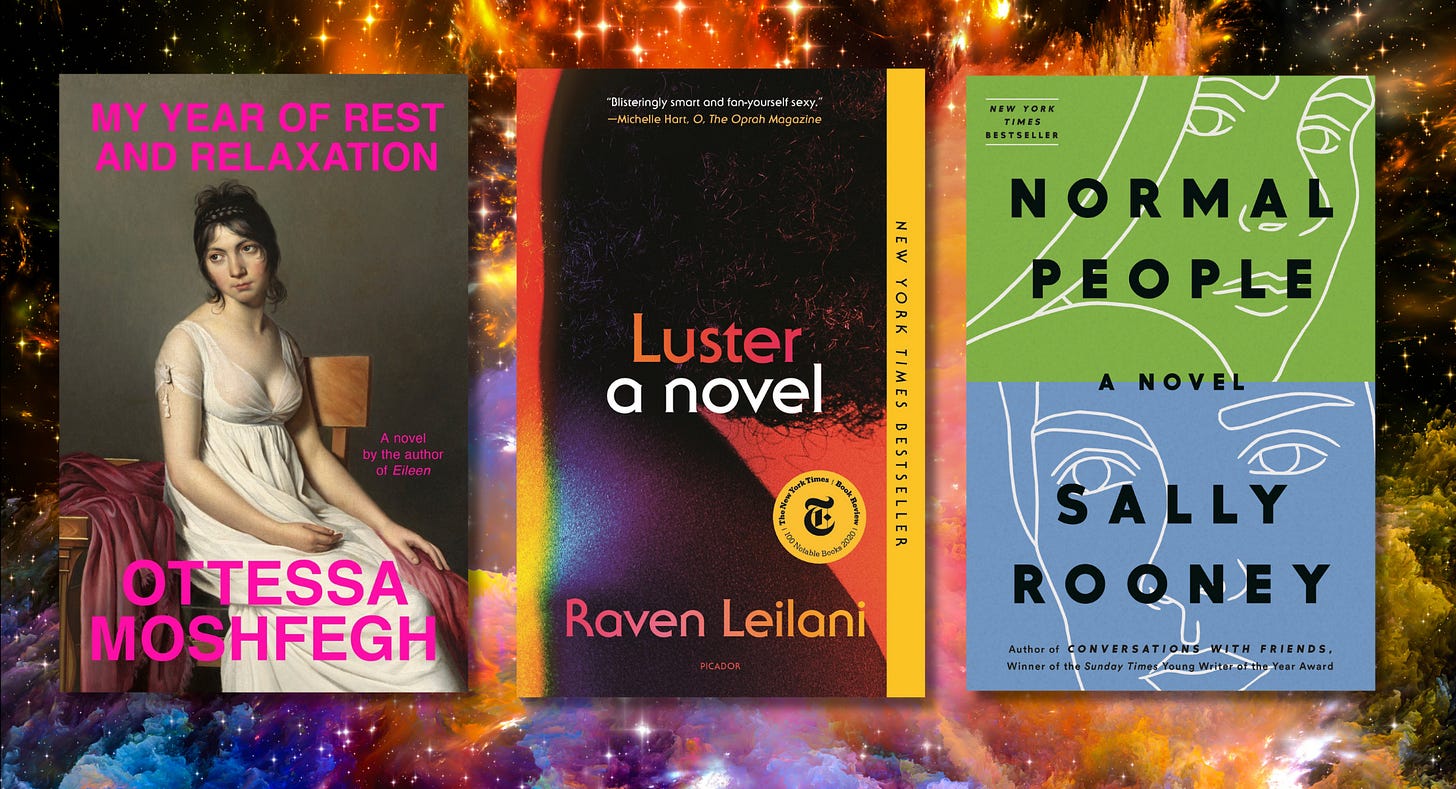
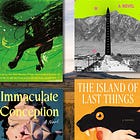

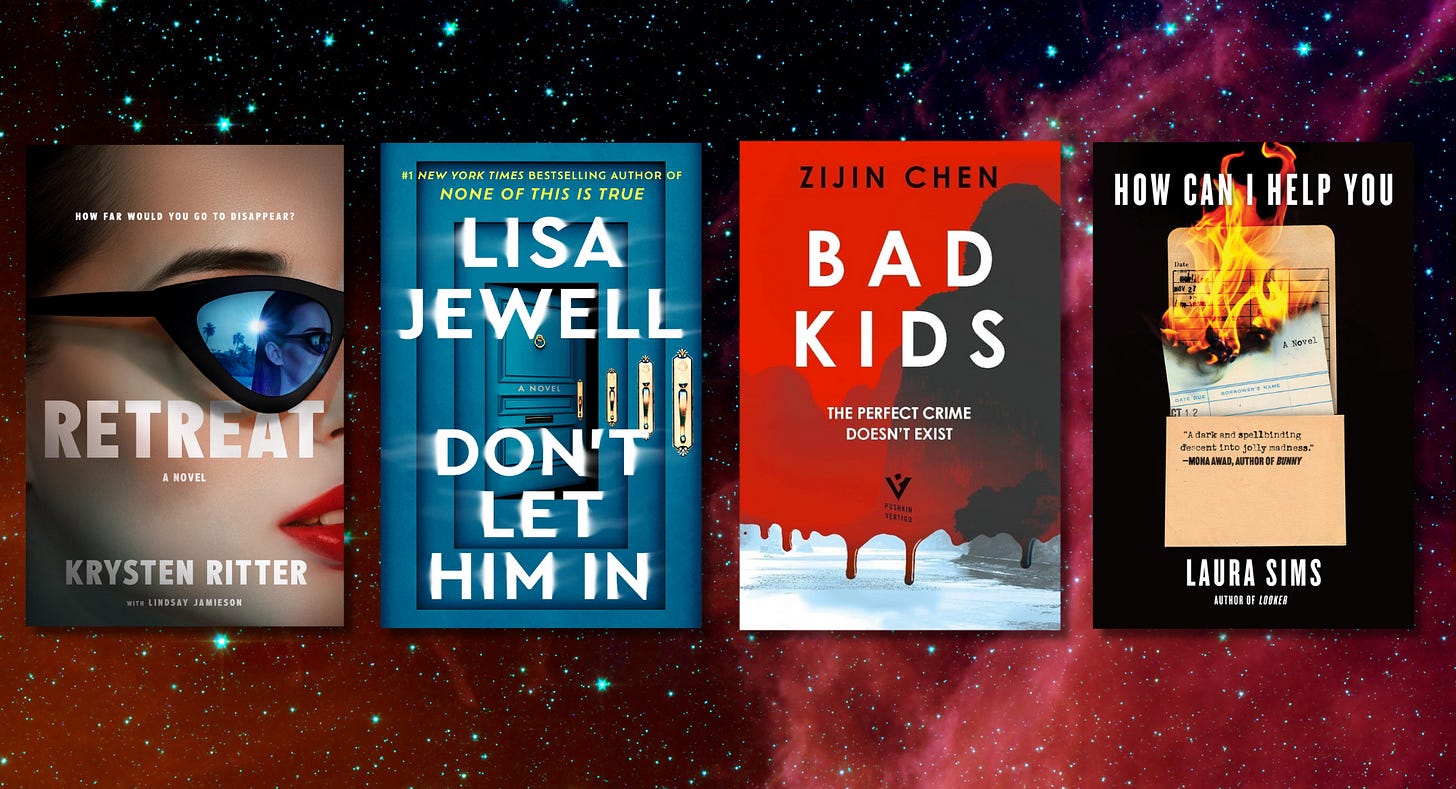
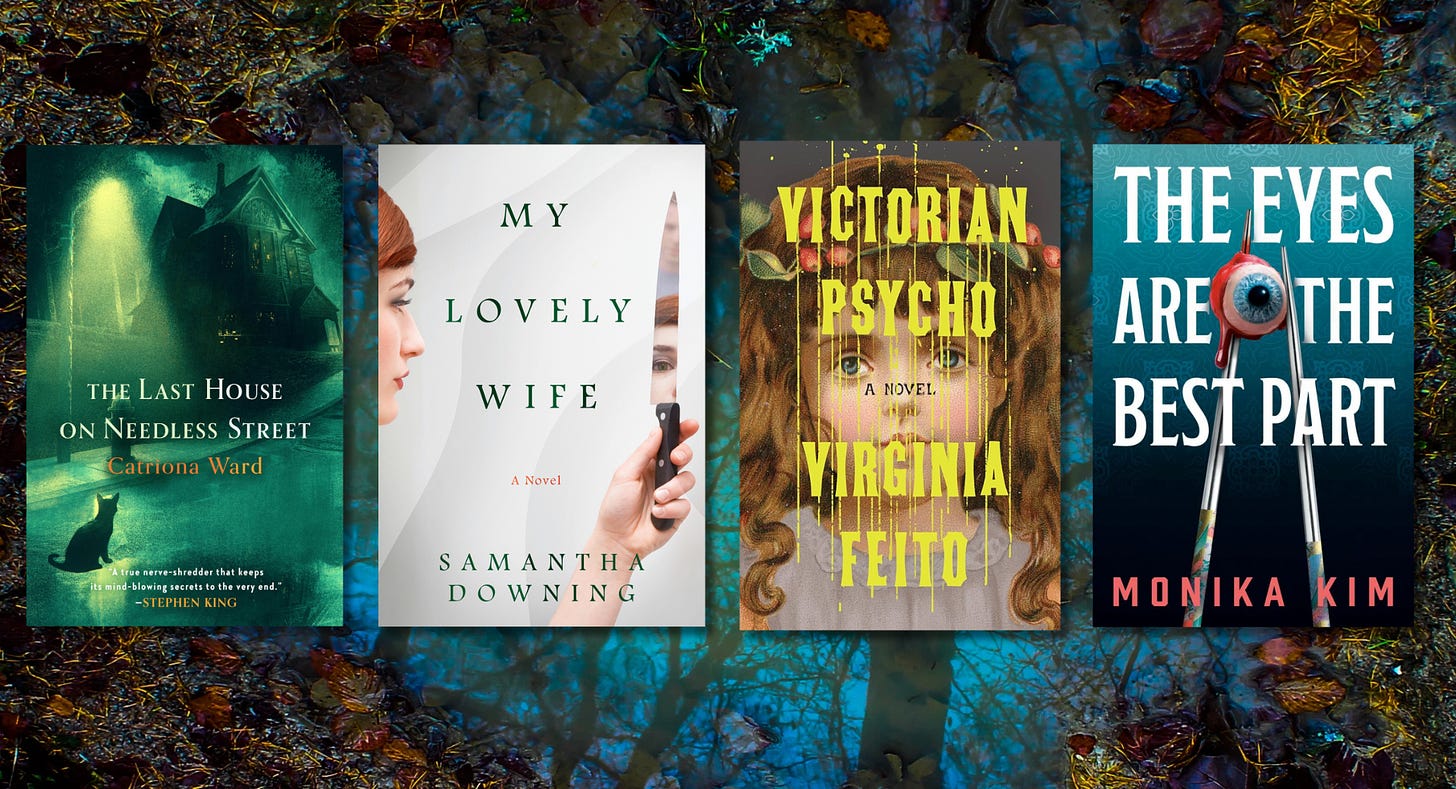
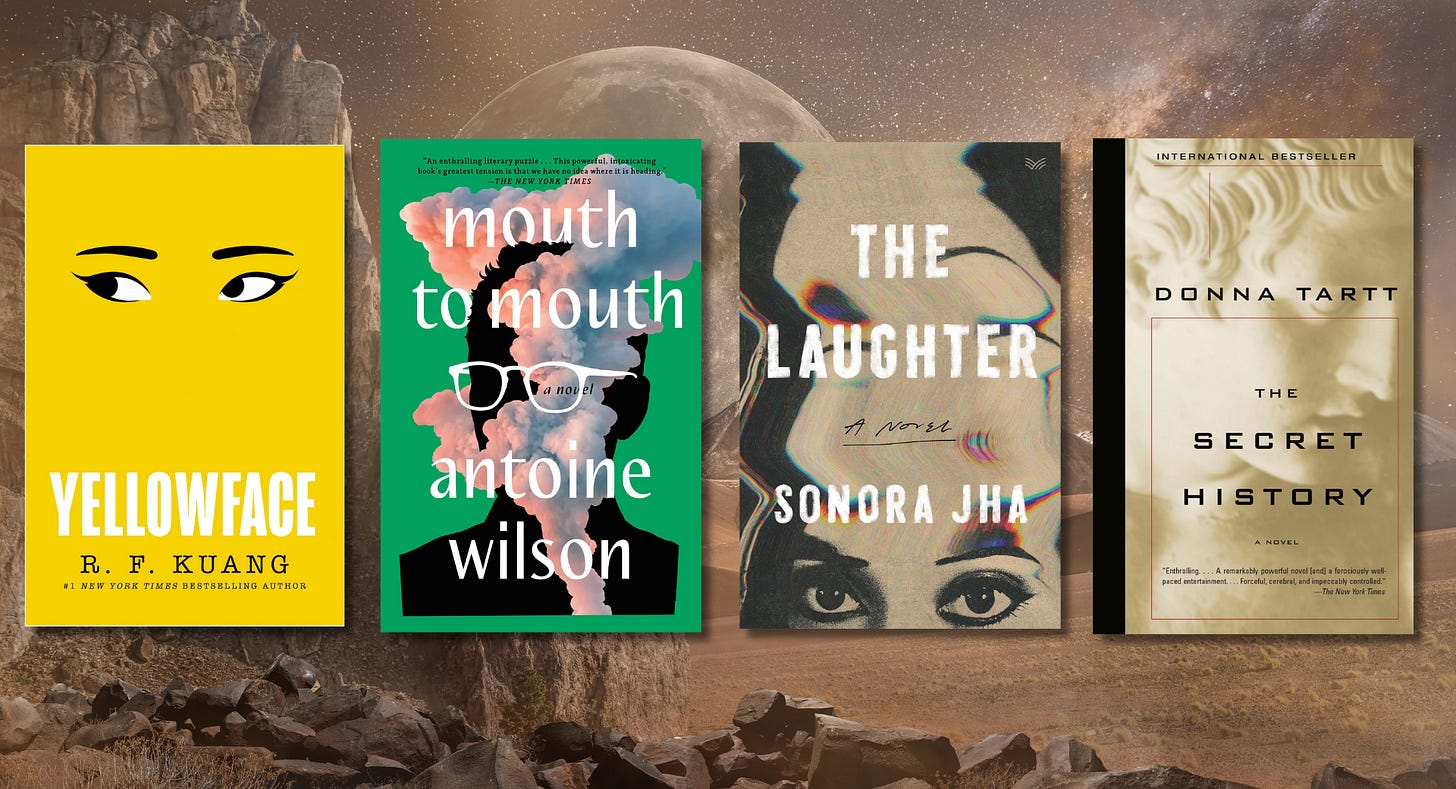
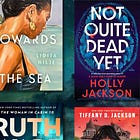

This was such an interesting article. I love the way you explain the different types of fiction. I'm sitting here thinking, what are my favourite types? I have a few of these on my tbr list.
I just love the way you describe and explain different types of literature. We share similar tastes and I will enjoy reading some of the books on this list. Problem .. where do I start?